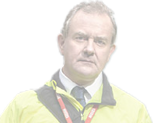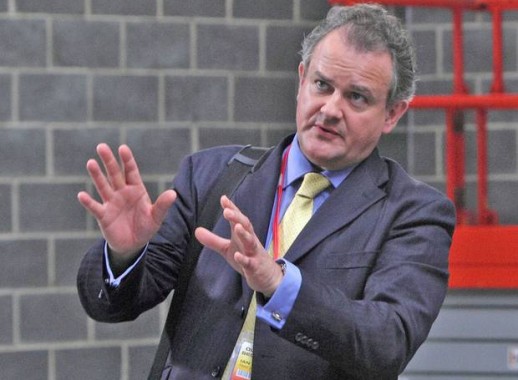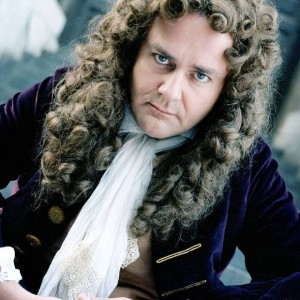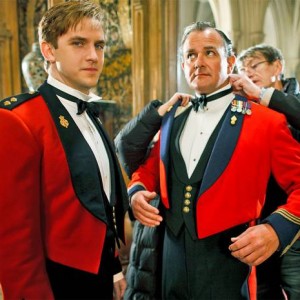Interview by James Rampton for The Independent
As the BBC’s Olympics satire Twenty Twelve returns for a second series, Hugh Bonneville talks to James Rampton about a role far removed from Downton Abbey but just as quintessentially English.
On 14 March last year, the Olympic countdown clock was unveiled at a grand ceremony in Trafalgar Square. Less than 24 hours later, it had ground to an embarrassing halt, which became known as the “Olympic clock-up”. In a spooky coincidence, that very same evening the climax of the first episode of Twenty Twelve, a mockumentary about the fictional Olympic Deliverance Commission written several months earlier, featured an Olympic clock, which had – you’ve guessed it – ground to an embarrassing halt. A (real-life) London 2012 spokesman was forced to release a statement saying, “It could be a case of life imitating art.”
Twenty Twelve, which returns to BBC2 at 10pm on Friday, is full of these spot-on satirical moments. In fact, it could win a gold medal for prescience. This spoof fly-on-the-wall documentary, which won the Best Sitcom gong at the British Comedy Awards last year, tracks the confederacy of dunces who tie themselves in increasingly complex knots attempting to prepare for the biggest event this country has ever hosted.
The ODC is run by the hapless Ian (played by Hugh Bonneville). He is hindered by his gloriously inept team, who include the spectacularly un-self-aware PR chief, Siobhan (Jessica Hynes). It is entirely appropriate that the show’s theme tune is “Let’s Face the Music and Dance” (There may be trouble ahead…”).
In this week’s first episode, for instance, the team gets itself into a diplomatic pickle after the Algerian squad threatens to pull out of the Olympics because London’s “Shared Belief Centre” does not face Mecca. Ian repeating his mantra – “That’s all good” – only makes matters worse.
So could the actual Olympic delivery team possibly be as shambolic as their fictional counterparts? “Oh no,” Bonneville deadpans. “That would be like invading a country without having thought about what would happen afterwards. It couldn’t happen!”
I’m on the set of Twenty Twelve on the 37th floor of Canary Wharf, a javelin throw away from the real-life Olympic Park. All around the walls of the ODC are painted “inspirational” slogans: “Achieve”, “Sustain”, “Courage”, “Heritage”, “Diversity”.
These are supposed to fire up the ODC team, but what they really do is underline the meaninglessness of so much management-speak. Twenty Twelve, which is written and directed by John Morton (previously responsible for the excellent mock-doc series, People Like Us), is as much about the emptiness of office jargon as Olympic delivery.
Bonneville, 48, is sitting in the Canary Wharf green room between scenes. The actor has achieved global fame as Lord Grantham in Downton Abbey – to such a degree that he was one of the guests at President Obama’s Anglo-American dinner earlier this month.
Today, however, Bonneville is dressed in Ian’s natty executive suit, and his hands are covered in prosthetic scars. These emphasise that his character’s incompetence extends to his complete inability to fold up his bike without cutting himself.
Bonneville has a typically English sense of self-deprecation – he once said that he would like his epitaph to be, “Oh, him. Oh well.” A Cambridge graduate, he is as lucid and articulate as his screen alter ego is verbose and opaque. The actor says that Twenty Twelve, “Happens to be set against the backdrop of the Olympics, but it could be set in any office. The series is not having a go at the Olympics, but highlighting the way management operates.
“The series simultaneously skewers and celebrates the absurdity of the language we use to hide our own incompetence. It shows how we employ words as a way of masking communication. John’s scripts are very good at pinpointing how we say we’ll do something while actually doing nothing. It’s like when Marjorie is asked to hire a tea urn for the village fete and we have to listen to her excuses when it doesn’t turn up – we enlarge that to an Olympic scale. It’s management-speak writ large.”
He continues, “John has always got a third ear out listening for the buzzwords of the moment. He makes them up too, but they are always worryingly plausible! Look at the character of Siobhan. She comes in with this drone of PR phrases – “we’re totally plugged in” and “it’s virtually a virtual front door”.
“She is obviously too old to be using this supposedly cool language. She wants to be from America, but is actually from Essex. I love those characters who aren’t as intelligent as they think they are.”
One of the reasons Twenty Twelve works so well is that the cast play it absolutely straight. They never give us an inkling that they think their lines are funny. The more seriously they take their world, the more amusing we find it.
Bonneville explains that, “John takes a feasible situation and nudges it to the point where it takes you a beat before you think, ‘Actually, this is ludicrous. How could they be discussing whether stationery cupboards could be re-categorised as urinals?’ John is brilliant at spotting two things that are plausible, putting them together and making a third thing that is ridiculous.
“His maxim is, ‘Go faster and don’t smile’. It works. If the characters take it more seriously than anyone else, then that emphasises the ludicrousness of their behaviour.”
For all Ian’s laughability, Bonneville clearly has a soft spot for his character. “Ian is a man who can. He sees himself as an enabler and a go-to guy and thinks that his job is to wrangle the now – that’s how he talks. He’s worked extensively on three major festivals: Cardiff City of Culture, Newcastle City of Hope and Norwich City of Incredulity.
“He has a range of skills, from management to firefighting – sometimes literally. He is great at running committees; just not this particular committee. He says things like, ‘Because of the cuts, the 100m dash will now be the 60m dash’. We all know Ians, people who have to paddle like hell because they’re out of their depth. They’re not really in charge. There is always an upstairs to answer to.”
The son of a surgeon and a nurse, Bonneville was born Hugh Williams (he had to change it because there was already another actor with that name). His love of performing was sparked when he joined the National Youth Theatre. After attending Sherborne School and reading theology at Corpus Christi College, Cambridge, he went to Webber Douglas Academy of Dramatic Art, whose alumni, funnily enough, also includes Julian Fellowes, the creator of Downton Abbey.
He made his professional debut at the Open Air Theatre in Regent’s Park before appearing at the National Theatre in 1987. Three years later, he joined the RSC, where he played Laertes to Kenneth Branagh’s Hamlet. He made his television debut in the 1990 con-man drama Chancer.
He went on to appear in such dramas as Madame Bovary, Notting Hill, Mansfield Park, Iris, Tipping the Velvet, Love Again, Freezing, Lost in Austen and Doctor Who. He has been married for the last 14 years to Lulu Williams, who is a full-time mother to their son, Felix. They live in West Sussex.
Two years ago, Bonneville broke through to another level when he became master of all he surveyed at Downton Abbey. He is currently working on the third series, but he is still at a loss to explain the show’s worldwide success. “If we could answer that, then we’d all be millionaires because we’d all be writing it.
“But I think that quite apart from the production values and the scripts, the timing just happened to be very good, because it’s about a world that had confidence in itself. That was an era when Britain, rightly or wrongly, felt very confident about who it was as a nation, and we’re not like that at the moment. Now we don’t have a clue about what’s going on, and we are on the edge of an economic precipice. So Downton Abbey came out at a time when people simply wanted to escape on a Sunday night.
“Julian writes three-dimensional characters,” he continues. “Even those who do wrong things have redemption within them, while the characters who do good things are flawed.
“Look at my character. Lord Grantham is not the stereotypical evil landowner. He is the custodian of a living thing which is the estate, and his only job is to make sure it is handed on to the next generation intact. Woe betide him if a single piece of Chippendale furniture goes missing on his watch. Above all, Julian has written characters that viewers can connect with. They display a peculiar sense of dignity that audiences like to dip into.”
Bonneville maintains that we also enjoy immersing ourselves in the very different world conjured up by Downton Abbey. “The fantasy is certainly appealing. On the set, we jokingly say, ‘I’d love to have someone lay out my clothes for me every day’. Who wouldn’t like to be driven around everywhere and change their clothes four times a day because they have nothing else to do?”
Downton Abbey has attracted some criticism for perceived historical inaccuracies, but Bonneville argues that, “It’s a piece of TV, not social history. I’m sure they make mistakes on Mad Men, too. But we aspire to get it right.”
He adds that, “When Thomas the footman said after Cora’s miscarriage, ‘I don’t see what all the fuss is about, the baby would only have been the size of a hamster’, we got a fantastic letter. It said, “The Syrian hamster did not appear in London until 1924. He should have said ‘a small rabbit’. We all find pedants irritating, but at least it shows they care. It proves they have been captivated – even if we get our hamsters wrong!”
Finally, returning to the subject of Twenty Twelve, does Bonneville think there could be a life for the ODC after the Olympics? “Absolutely. They could go and help with the organisation of the Rio Games in 2016.
“But ultimately, this is a crack team that could go anywhere and manage anything – the City, say, or the armed services. The NHS also needs rebranding. They could get Ian in to announce, ‘If health is about anything, it’s about managing expectations. We have got to get people to appreciate there are a lot of positive things about ill health. We need to make it sexy’.”
That’s all good.











